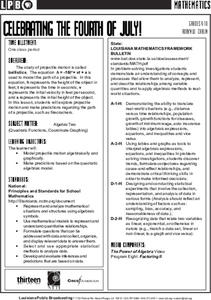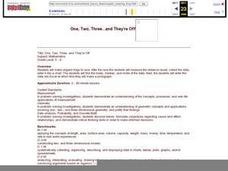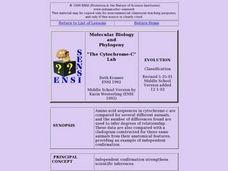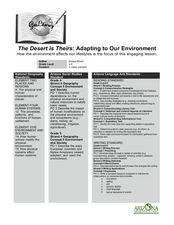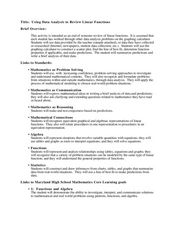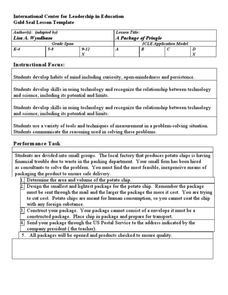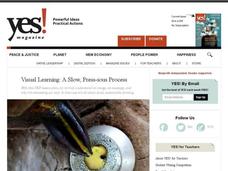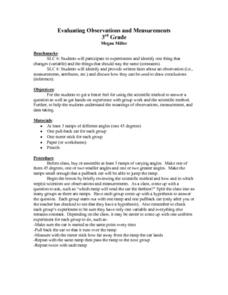Curated OER
The Amazing Apple
Students analyze an apple. In this lesson about developing inquiry skills, students do an experiment with an apple. Students make several observations about the apple. Students answer questions to help them improve and practice their...
Curated OER
Gathering Data to Problem Solve
Learners, while using reading and writing strategies (subheads, prediction, skim, details, drawing inferences, etc,), solve math problems that involve gathering and representing data (addition, subtraction, multiplication). They practice...
Curated OER
Molecular Movement in Water Part 1- Diffusion
High schoolers obseve and compare molecular movement within water at various temperatures and of varying salinity. They discuss the movement of water on a larger scale which can affect the movement and concentrations of microbial...
Curated OER
Preliminary information
Students develop reading strategies: inferring meaning from context. They work together in order to negotiate the meaning of the various vocabulary items. Students predict the personality of the main character in each of the books.
Curated OER
Celebrating the Fourth of July!
Young scholars model projectile motion algebraically and graphically; and make predictions based on the quadratic algebraic model.
Curated OER
One, Two, Three...and They're Off
Students make origami frogs to race. After the race they measure the distance raced, collect the data, enter it into a chart. They then find the mean, median, and mode of the data. Next, students enter this data into Excel at which time...
Curated OER
Clouds
Students explore clouds. In this weather lesson, students identify the steps in the water cycle, define condensation and evaporation, and relate this information to cloud formation. Students perform a cloud experiment,...
Curated OER
What's the Best Deal?
Young scholars explore number sense by solving consumer math problems. In this pattern identification lesson, students analyze a list of numerical and geometric patterns while predicting the future outcome. Young scholars utilize...
Curated OER
Energy Divide
Fourth graders, after viewing a video on "The Future" Fossil Fuel grade, participate in an energy consumption simulation game in order to analyze how consumption, population, and choice of resource affect the availability of future...
Curated OER
Bossy Britain Upsets Colonists
Students examine the causes of dissatisfaction that led to the American Revolution. Then they make a Flap Vocabulary Book and glue on a map of the thirteen colonies and make a title page called "Road to War in it." Students also...
Curated OER
Rock Art Caves
Fourth graders research the rock art caves that are found in Texas. In this rock art instructional activity, 4th graders use assigned web sites to find information about the rock art that is found in caves in Texas. They work in small...
Curated OER
Cooler in the Shadows
Students explore Earth science by creating a scale model in class. In this shadow lesson, students research the impact the sun has on Earth shadows and complete a space science worksheet. Students create models of the Sun and Earth and...
Curated OER
The Cytochrome-C Lab
Students examine a method biologists use to try to determine relationships. They examine how amino acid sequences have been determined for a number of proteins, and how scientists can make inferences about DNA based on the amino acid...
Curated OER
Eating Healthy
Students review healthy eating habits, and demonstrate reading comprehension skills, including reading strategies, inference, literal meaning, and critical analysis.
Curated OER
What Is the Nature of Science?
Students distinguish between scientific and everyday meanings of key words-theory, hypothesis, law, fact-and use in context. They recognize the variables that affect observation, data collection, and interpretation. They discover the...
Curated OER
Cities and Seasons
Students explore how satellite images show seasonal changes in seven cities in North and South America. Through a sequence of images, they study the green-up and brown-down of the seasons and how seasons change over time. Afterwards,...
Curated OER
What Made George Washington a Good Military Leader?
Students identify the qualities of an effective military leader. In this Revolutionary War instructional activity, students view several Internet resources about George Washington's life. Student groups research one of four battles, and...
Curated OER
The Desert is Theirs: Adapting to Our Environment
Students determine how animals and people adapt to the desert environment. In this desert lesson, students review vocabulary about the desert and how humans have to make changes to accommodate their environments. They listen to and...
Curated OER
Using Data Analysis to Review Linear Functions
Using either data provided or data that has been collected, young mathematicians graph linear functions to best fit their scatterplot. They also analyze their data and make predicitons based on the data. This instructional activity is...
Curated OER
A Package of Pringle
Here is a problem-solving instructional activity that has learners take the role of a packaging expert to design an inexpensive means of packaging a potato chip. It could benefit from having more specific detail about the instructional...
Curated OER
Carbons to Computers - 1
Students gather and classify information from observation of photographs; to have students differentiate between fact and inference.
Curated OER
Visual Learning: A Slow, Press-ious Process
Students observe a photograph and make inferences. In this investigative lesson students study how to find facts in pictures and draw inferences from them.
Curated OER
The Gummy Worm Lab
Middle schoolers participate in a lab experiment with gummy worms. In groups, they record the qualitative and quantitative observations during the lab. They use their senses to make inferences about the experiment and share them with...
Curated OER
Evaluating Observations and Measurements
Third graders review the scientific method and how and in which steps scientists use observations and measurements. Then as a class, they hypothesize which ramp will send the car the farthest. They break into groups and send cars down a...






